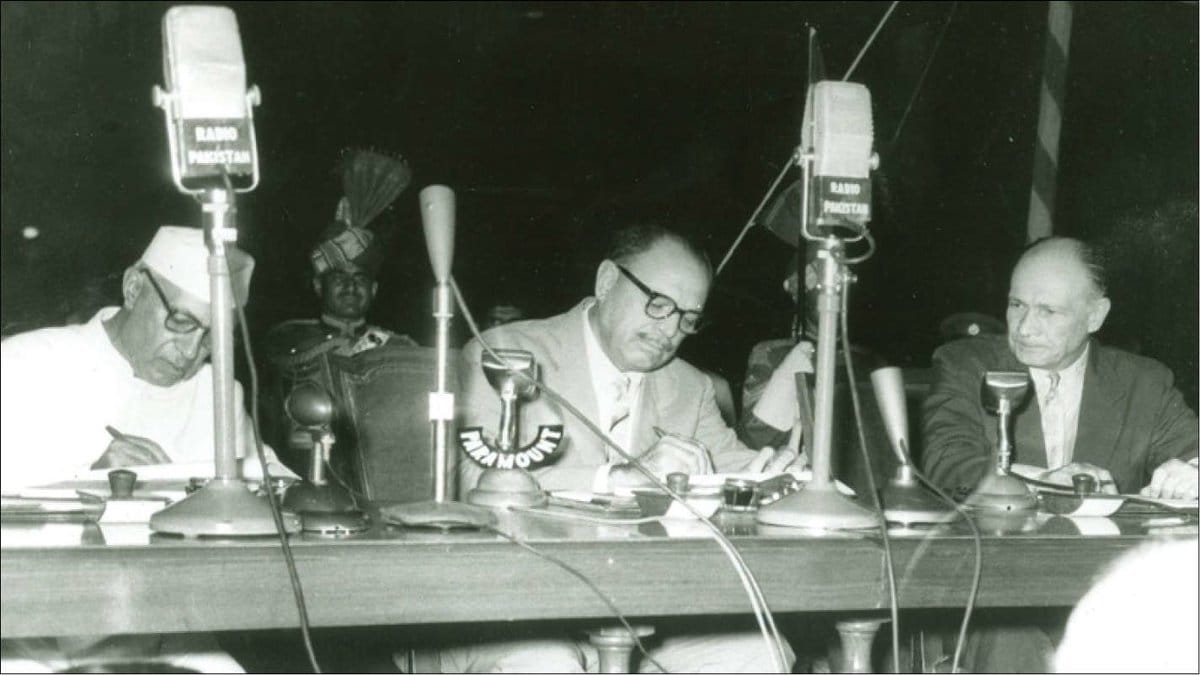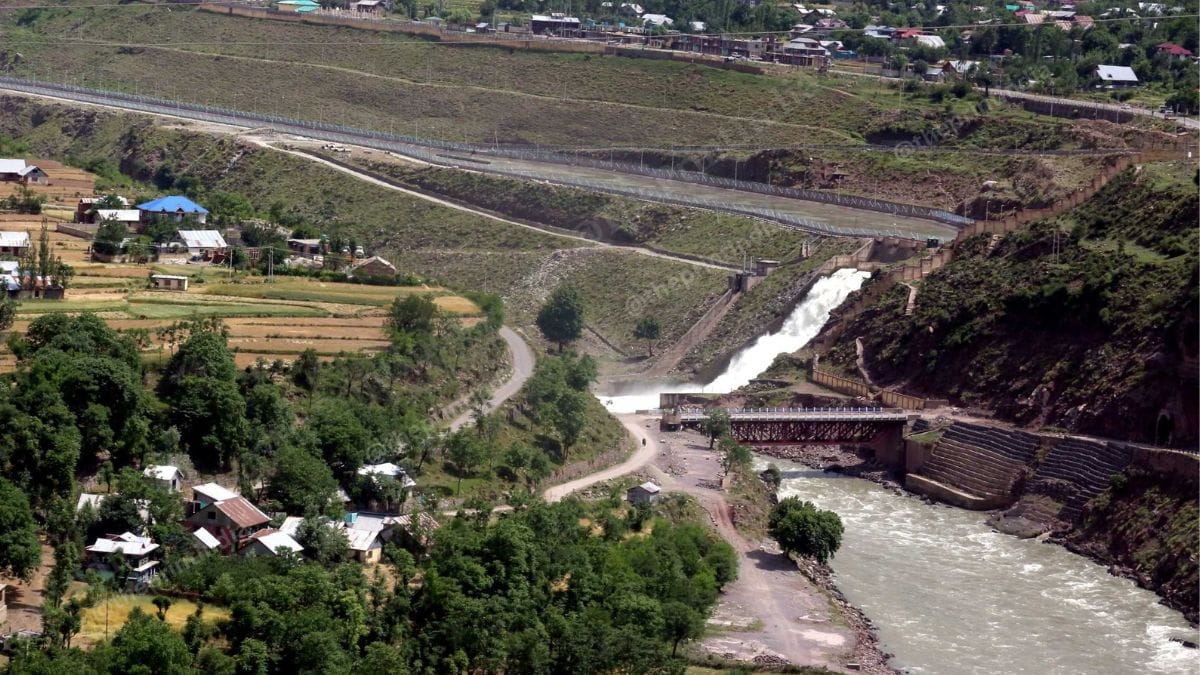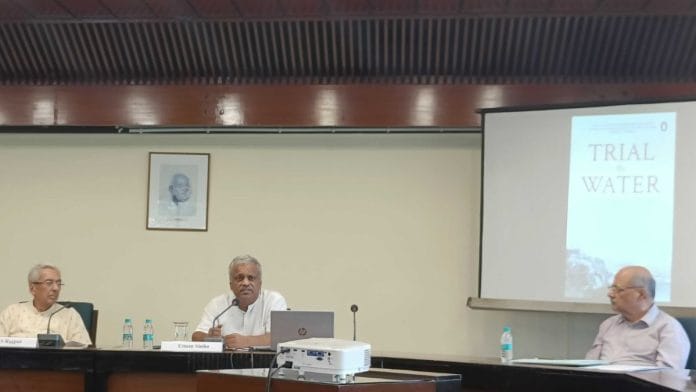New Delhi: Jawaharlal Nehru did not have a peer group to challenge him. That is Uttam Sinha’s answer to why the prime minister of the world’s largest democracy sat down with Pakistani dictator Ayub Khan in Karachi on 19 September 1960 to sign the Indus Waters Treaty.
“Politics was never out of the Indus Waters Treaty (IWT) talks. The treaty was buying peace with Pakistan. But did peace happen?” said Sinha, senior fellow at the Manohar Parrikar Institute for Defence Studies and Analyses, and a leading commentator on transboundary water issues. He was speaking at a lecture titled ‘Indus Waters Treaty: Looking Back, Looking Ahead’, held at the Centre for Contemporary Studies, Prime Minister’s Museum and Library, in New Delhi on 21 May.
In the 45-minute lecture, Sinha examined the complex history of IWT.
“He (Nehru) was a man who would contemplate a lot. On the IWT, he would often contemplate whether the end goal of peace with Pakistan had really been achieved. He was getting very worried about what the Pakistanis were doing,” he said, adding that soon after Ayub Khan signed the treaty, he wanted to claim the upper reaches of the western rivers in Kashmir.

“If you read some of Nehru’s writings on IWT, you will find a man who is quite perplexed,” Sinha said. Nehru signing the IWT—from a political point of view— was something that India should not have agreed to “because the outcome was not what he expected,” Sinha added.
Since Prime Minister Narendra Modi assumed power in 2014, Pakistan has increasingly used the Indus Waters Treaty as an instrument to delay projects on the western rivers, he stressed.
The rhetoric turned more hostile after the Pahalgam attack in April, which prompted India to hold the Indus Waters Treaty in abeyance. Pakistan’s military spokesperson, Lt Gen Ahmed Sharif Chaudhry, recently made inflammatory comments on the matter: “Tum hamara paani band kar doge, hum tumhara saans band kar denge. (If you stop our water, we will stop your breath).”
“For long, we were very patient with Pakistan and that is why IWT has survived for so long – even after the 1965, 1971, and 1999 wars,” said Sinha. “But India’s patience has come to an end.”
IWT politics
The Indus basin has great cultural significance and has defined the subcontinent’s politics for centuries.
The basin is intertwined with India’s history — from the Indus Valley Civilisation to Partition, and then from 1960 onwards, when the treaty was signed.
“The world’s largest basin has seen a whole lot of upheavals in terms of politics, in terms of the bloodshed—defining territories,” said Sinha, adding that in 1947, “the basin was very homogeneous, unitary, and had compact existence.” But when the boundary line was drawn, the basin fragmented, and two states competed over the water resources.

The 1960 IWT assigned the three eastern rivers – Ravi, Beas, and Sutlej – to India. Three western rivers – Indus, Jhelum, and Chenab – were assigned to Pakistan. The western rivers have more volume of water.
The main question is why India gave more water to Pakistan, said Sinha. This question was also raised in the parliamentary debates of November 1960, barely two months after the signing of the Indus Waters Treaty.
The socialist leader Ashok Mehta repeatedly questioned Nehru on the concessions to Pakistan, with no gain.
“I think this question (still) bedevils us,” said Sinha.
Recently, Union agriculture minister Shivraj Singh Chouhan said that Nehru not only agreed to give water to Pakistan at the cost of India but also gave Rs 83 crore, which now amounts to Rs 5,500 crore.
Also read:
Pakistan’s victimhood
The Indus Waters Treaty was worked out by civil engineers, said Uttam Sinha.
“It’s not a treaty where diplomats talked and signed,” Sinha said, describing the engineers as “dedicated people” who negotiated for eight to nine years. He has documented this in his 2021 book, Indus Basin Uninterrupted: A History of Territory and Politics from Alexander to Nehru.
When the first Indus Waters Treaty meeting was held in Washington DC in May 1952, India sent five expert engineers. Pakistan, on the other hand, sent 167 lawyers and just two engineers, said Sinha, quoting from archival records of the IWT.
“Pakistan has always tried to win the whole Indus basin through arbitration and through third-party involvement. They are good at campaigning what is called victimhood, and even today they are upfront to communicate that they are the lesser player and India is the aggressor,” Sinha added.
But things have changed since the Pahalgam attack in April.
“There has to be a line drawn at some point, and water can become an instrument, a coercive tool. This is what we’re trying to do at this moment,” he said.
India has raised concerns over the Indus Waters Treaty in the past, sending the first formal notice to Pakistan in 2023 to modify it. Islamabad never gave a satisfactory response, skirting around the core issue of modification.
“Our larger objective is to get Pakistan onto the negotiating table so that we can have a renegotiation of that treaty,” Sinha said.
(Edited by Zoya Bhatti)







Jiasudeen khazi alias Nehru Muslim was the biggest Anti Hindu,he always for Muslim pakistan,quite natural,a Muslim for another Muslim,sell out treaty of Hindus country water to his brothers pakistan.its was not for buying peace,all dramas to mislead fool Hindus and to help Muslim terrorists of Pakistan.jai Hindu unity Jai Hindus.